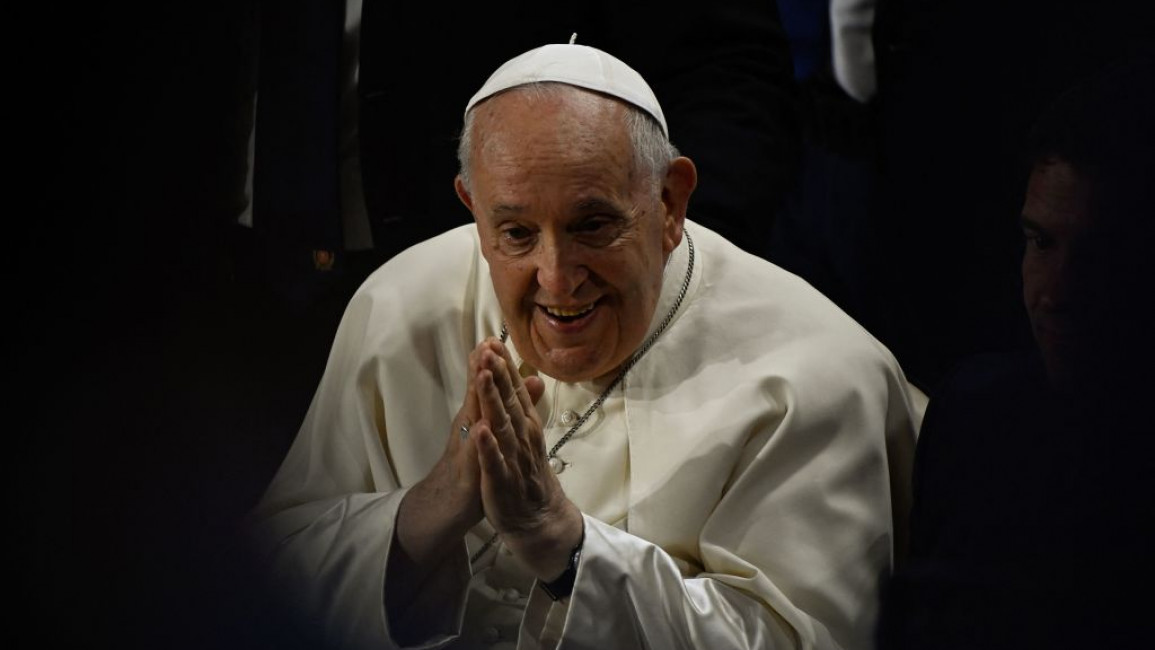Be 'good citizens', Pope Francis tells Chinese Catholics during Mongolia visit
Pope Francis on Sunday told Catholics in China to be "good Christians and good citizens", using his visit to Mongolia to help ease tensions between the Vatican and Beijing.
Following a mass before the scant Catholic population in Mongolia's capital of Ulaanbaatar, Francis turned his attention to officially atheist China, some of whose citizens had flown in for the pope's visit.
Flanked by Hong Kong's current bishop, Stephen Chow, and its bishop emeritus, Cardinal John Tong Hon, the 86-year-old pope said they joined him to send "a warm greeting to the noble Chinese people".
"To the people I wish the best," said the pope.
"To Chinese Catholics, I ask you to be good Christians and good citizens."
The unscripted comments were Francis's latest attempt to reassure China's Communist government, which is wary of the Church's presence in its country.
On Saturday, Francis appeared to send a more tacit message, telling a gathering of Catholic missionaries that governments had "nothing to fear" from the Catholic Church.
"Governments and secular institutions have nothing to fear from the Church's work of evangelisation, for she has no political agenda to advance," said the pontiff, without mentioning China explicitly.
In choosing to visit the vast, isolated nation of Mongolia sandwiched between China and Russia, the pope's goals were twofold.
On one hand, the trip showed the Jesuit's desire to bring the Church's message to remote, largely ignored areas where Catholicism is young and unfamiliar.
But looming over the trip has been a more strategic, geopolitical objective – that of thawing frosty relations with Beijing.
In the crowd at the mass held in a newly built ice hockey arena was a Chinese woman who had travelled from the northwestern city of Xi'an.
Telling AFP it was "rather difficult to come here", she described how the two organisers of her group's pilgrimage had been detained back in China.
"Let me tell you, I feel so ashamed to hold the [Chinese] national flag," she said.
"But I need to hold it and let the Pope know how difficult it is for us."
Benefit to society
Earlier on Sunday, Francis assembled leaders of different religions operating in Mongolia in an intimate theatre – designed in the round shape of the nomadic "ger" dwelling – nestled in the low mountains encircling the city.
"Religious traditions, for all their distinctiveness and diversity, have impressive potential for the benefit of society as a whole," the Argentine Jesuit told the group, which included Christians, Muslims, Buddhists, and representatives of Shamanism, among others.
Following his speech, a head monk at a Buddhist monastery in Mongolia, Natsagdorj Damdinsuren, said the pope's visit "proves the solidarity of the human race declaring peace together".
"I am just a humble Buddhist monk but for me, war and conflict are the most tragic events of our time. I guess other religions agree with me," Damdinsuren said.
'Really genuine'
In the ice rink's stands, Mongolian student Nomin Batbayar said Francis's focus on interreligious dialogue recalled "how my ancestors in the 13th century felt, with Buddhism, Islam, Shamanism, Christianity in the same city, living peacefully with each other".
"I just feel he is a really genuine person, that's why all these one billion people around the world believe in him, supporting him," said Batbayar, 18.
"China isn't really supporting him, but their people are here today."
A Chinese woman at the mass from Hebei told AFP she felt "so blessed and happy to be able to be here and see the pope".
"To have our own religion doesn't mean that we are against our country," she added.
"We actually pray for our country."
Freedom of religion in Mongolia, which became a democracy in 1992, is in sharp contrast to neighbouring China.
Video highlights of Pope Francis’ encounter with Mongolia's ecumenical and religious leaders at the Hun Theatre in Ulaanbaatar.#PopeInMongoliahttps://t.co/6w3fus3hcM pic.twitter.com/clNFJMeWhs
— Vatican News (@VaticanNews) September 3, 2023
The Holy See renewed a deal last year with Beijing that allows both sides a say in appointing bishops in China.
Critics have called the move a dangerous concession in exchange for a presence in the country.
Asked about the pope's apparent overtures to Beijing, Hong Kong Bishop Stephen Chow told AFP the pontiff's message was intended "for the whole world".
"The Church now... really [has] no intentions to become political and that's important to us," he said.
"Otherwise we lose our credit as an institution talking about love and truth."
'Pilgrim of friendship'
Calling himself a "pilgrim of friendship", Pope Francis extolled Mongolia's virtues during his visit, but warned of the dangers of corruption and environmental degradation, two major challenges faced by the nation.
The capital suffers from some of the world's worst air quality and an embezzlement scandal sparked street protests last year.
Vast swathes of the country are also at risk of desertification due to climate change, overgrazing and mining.
There are about 1,400 Catholics in Mongolia out of a population of 3.3 million people. Only 25 are priests, and just two of those are Mongolian.
Buddhism and Shamanism are the main religions followed in Mongolia.



